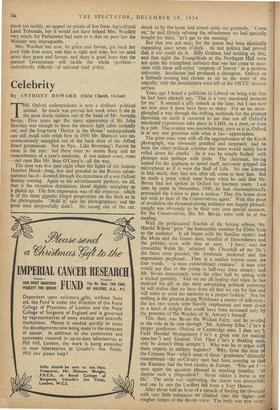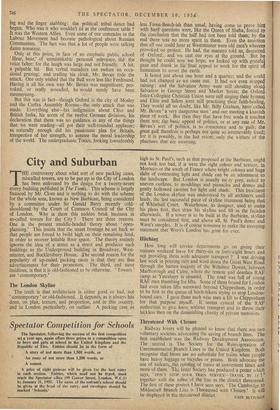Celebrity
By ANTHONY HOWARD (Christ Church, Oxford) THE Oxford undergraduate is now a civilised political animal. So much was proved last week when it ate in the most docile fashion out of the hand of Mr. Aneurin Bevan. Five years ago the mere appearance of Mr. John Strachey was enough to have the electric light cable instantly cut; and the long-term 'Doctor in the House' undergraduate can still recall with relish how in 1950 Mr. Shinweil was un- ceremoniously smuggled out of the back door of the Alfred Street gymnasium. Not so Nye. Like Browning's Patriot ho came in the rain : but there were no stones flung and no remembrance of a year's misdeeds. It was indeed roses; roses ----red ones like Mr. Sean O'Casey's—all the way. The time was live past eight when the lights of the famous Humber Hawk—long, low and graceful as the Rootcs adver- tisement has it—toomed through the dreariness of a wet Oxford Sunday evening. Again as the advertisement predicts, we all, that is the reception deputation, Stood slightly straighter as It glided up. The first impression was of the overcoat—which Is of the same gigantic Gogol proportions on the flesh as In the photographs. 'Hold it,' said the photographers; and the great man purposefully didn't. He swung out of the car, 1, shook us by the hand, and tossed aside our gratitude. Come on,' he said (firmly refusing the refreshment we had specially bought for him), let's get to the meeting.' But that was not easy; for the queue had been elastically expanding since seven o'clock. At last politics had proved that it too could do it. Billy Graham had nothing on this; and that night the Evangelicals at the Northgate Hall were not quite the triumphant radiance that one has come to asso- ciate with these self-styled outposts of heaven' in a modern university. Secularism had produced a champion. Oxford on a Sabbath evening had chosen to sit in the tents of the ungodly; only the doorkeepers were left at the OICCU mission service.
Years ago I heard a politician (a Liberal on being told that he had been ,elected) say, This is a very emotional moment for me.' It seemed a silly remark at the time; but I can now see how easy it must have been to make. For as we snow- ploughed a way through the drifting multitude for the greatest showman on earth it occurred to me that not all Oxford's emotional experiences take place in LMH, on a punt, or even in a pub. The ovation was overwhelming; poor as it is, Oxford is at any rate generous with what it has—appreciation. The great man, even with all the aggressiveness of the Karsh photograph, was obviously gratified and surprised; had he been the other political colossus the tears would surely have rolled down his cheeks. - As it was he simply flushed with pleasure and perhaps with pride. The chairman, having waited for the applause to spend itself, nervously gripped the microphone as if it were the Staff of Life. No one listened to him much; they had not, after all, come to hear him. But he made a point which went home when he said that Mr. Bevan had not spoken in Oxford for fourteen years. Last time he came in November, 1940, he had characteristically persuaded the Union to pass a motion That this house does not wish to hear of the Conservatives again.' With this piece of revelation the thousand-strong audience was hugely pleased: tonight was obviously to be their very own special occasion, for the Conservatives, like Mr. Bevan, were with us at the meeting.
With the professional flourish of the boxing referee. Mr. Harold Wilson 'gave' the honourable member for Ebbw Vale to the audience. It all began with the familiar stutter; and the Mods and the Greats men, mindful of Demosthenes and the pebbles, were with him at once. I have,' said the irresistible Welsh lilt, 'admired Mr. Churchill all my life the faces were puzzled, the foreheads puckered and the expressions perplexed. Then in a sudden torrent came the four words, ----a most extraordinary creature.' A man who would pay that to the young is half-way there already; and Mr. Bevan immediately went the other half by stating with a wicked geniality, And we are all hoping that when he has received his gift at this most astonishing political ceremony he will realise that we have done all that we can for him and will retire to write his memoirs in a proper fashion.' Not for nothing is the greatest living Welshman a master of inflection: the last two words were heavily emphasised and went down to a howl of delight that could have been increased only by the presence of 'The Warden of St. Antony's himself. This, then, was Bevan the Wicked Fairy; and he revelle4 in the role as he tore through Mr. Anthony Eden' (` he's a proper gentleman--Oxford or Cambridge man, I dare say ), Field Marshal Montgomery (' he's a great one for making speeches ') and General Van Fleet (he's a thinking man, only he doesn't think straight '). Who was he to argue with these experts in military logistics? Why, from the time of the Crimean War--which most of these 'gentlemen' distinctlY remembered—the ex-Cavalry men had been assuring us that the Russians had the best cavalry in Europe. Who am f '— once again the question phrased in mocking humility- tO dispute such a proposition? Never ridden a horse in my life.' The smile was captivating, the charm was irresistible: and one by one the Lucifers fell from a Tory Heaven. Ing and the finger stabbing: the political tribal dance had begun. Who was it who wouldn't sit at the conference table ? It was the Western Allies. Even some of our comrades in the Labour Movement had become pathological about Russian Communism. The fact was that a lot of people were talking damn nonsense.
Only at this point, in face of an emphatic public school Hear, hear,' of unmistakable personal relevance, did the voice falter; for the laugh was large and not friendly. A hit, a palpable hit. But verbal matadors can endure an occa- sional grazing; and trailing his cloak, Mr. Bevan rode the attack. One only wished that the Bull were less like Ferdinand. Having it all his own way Mr. Bevan was magnificent; pro- voked, or really wounded, he would surely have been mesmerising.
But this was in fact—though Oxford is the city of Mosley and the Carfax Assembly Rooms—the only attack that was made. Everything else—his indignation about Clive and British India, his scorn of the twelve German divisions, his declaration that there was no guidance in any of the things that we were reading—all got their well-rounded applause; as naturally enough did his passionate plea for Britain, irrespective of her strength, to assume the moral leadership of the world. The undergraduate Tories, looking considerably less Front-Bench-lab than usual, having come to prove hinl with hard questions were, like the Queen of Sheba, forced to the conclusion that the half had not been told them; by the end there was no more spirit in them. Even the assertion that all one could hear at Westminster were °Id men's wheezeS provoked no protest. He had, the maestro told us, despaired of Oxford; and we cast our eyes at the ground. But h thought he could now see hope; we looked up with grate gaze and drank in his final appeal to work for the spirit o humanism to cover the earth.
It lasted just about one hour and a quarter; and the world had not changed as we came out. It had not even stopped raining: and the Salvation Army were still shouting aloud Salvation in George Street and Market Street; the Oxford Inter-Collegiate Christian Union were still singing their hymns; and Elim and Salem were still practising their faith-hcalingi, They would all no doubt. like Mr. Billy Graham, have'called Mr. Bevan a very dangerous man' and our meeting a knavish piece of work. But then they that have free souls it touches them not; the basic appeal of politics, or at any rate of Mr. -Bevan's sort of politics, is to conscience and to guilt; the great gulf therefore is perhaps not quite so irretrievably fixed; for it is possibly, in the last resort, only the withers of the pharisees that are unwrung.









































 Previous page
Previous page